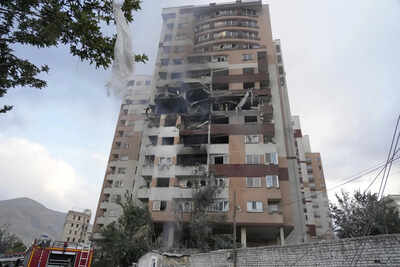Netanyahu’s Iran strike: A rebuke to Trump’s ‘Man of Peace’ pledge; what’s next

On Thursday night, Israeli jets unleashed a coordinated “preemptive” air campaign against Iran’s nuclear and military infrastructure-bombing enrichment facilities at Natanz, key Revolutionary Guards installations in Tehran and ballistic-missile sites around the country-just hours after President Donald Trump publicly implored Prime Minister Benjamin Netanyahu to hold off. Netanyahu named the operation “Rising Lion,” warning it would “continue for as many days as it takes to remove this threat”.Why it matters
- Trump’s peacemaker promise under fire: From the outset of his second term on January 20, 2025, Trump cast himself as a global deal-maker-securing a Gaza ceasefire, brokering talks in Oman and vowing to end the wars in Gaza, Ukraine and curb Iran’s nuclear ambitions. Netanyahu’s unilateral strike not only undermines those diplomatic efforts but also exposes the limits of Trump’s influence over a key ally.
- Shortly after the strikes, Trump said on social media platform Truth Social: I gave Iran chance after chance to make a deal. I told them, in the strongest of words, to “just do it,” but no matter how hard they tried, no matter how close they got, they just couldn’t get it done. I told them it would be much worse than anything they know, anticipated, or were told, that the United States makes the best and most lethal military equipment anywhere in the World, BY FAR, and that Israel has a lot of it, with much more to come – And they know how to use it. Certain Iranian hardliner’s spoke bravely, but they didn’t know what was about to happen. They are all DEAD now, and it will only get worse! There has already been great death and destruction, but there is still time to make this slaughter, with the next already planned attacks being even more brutal, come to an end. Iran must make a deal, before there is nothing left, and save what was once known as the Iranian Empire. No more death, no more destruction, JUST DO IT, BEFORE IT IS TOO LATE. God Bless You All! (SIC)
- US-Israel relations strained: Though Israel relies on Washington for weapons and intelligence, this mission proceeded without US coordination. Secretary of state Marco Rubio stressed “we are not involved in strikes against Iran” and urged Tehran “not to target US interests” (AFP). The disconnect has prompted questions about whether America will be drawn into defending Israel if Iran retaliates.
- Regional stability at risk: The attack risks igniting fresh conflicts across the Middle East. Iran has already vowed “decisive” retaliation against its “sworn enemies,” heightening the possibility of strikes on US bases, Red Sea shipping by Houthi proxies and renewed hostilities in Gaza and Syria.
Zoom in
- Natanz’s resilience: Buried deep under mountains, the Natanz enrichment halls have withstood previous Israeli sabotage and covert operations. While jets can inflict damage, restoring capacity-swapping centrifuges, repairing cascades-can take weeks, not years. Last year’s strikes set Iran back by an estimated 12–18 months; this round may only marginally extend that delay without sustained pressure.
- Mossad’s covert campaign: According to senior Israeli officials, a parallel sabotage effort led by Mossad targeted Iran’s air defenses and missile depots over the past year. These clandestine actions-planting explosives, cyber intrusions-underscore that the air campaign is but the visible tip of a multifaceted strategy to “roll back the Iranian threat.”
- Gulf state jitters: Riyadh, Abu Dhabi and Doha are bracing for fallout. US-brokered normalization deals hang in the balance as Gulf monarchies weigh security guarantees against the risk of becoming battlegrounds in a US-Israel-Iran showdown.
The big picture

A fractured peacemaking track record: Trump’s diplomacy hinged on high-profile announcements and personal outreach-his Sunday summit with Qatar’s emir promising “no nuclear dust” over the region, the planned June 15 meeting in Muscat between US envoy Steve Witkoff and Iranian officials, and last month’s removal of Syria sanctions. Yet each initiative has stumbled: Gaza talks collapsed; Russian President Vladimir Putin rebuffed a Ukraine ceasefire; and now Netanyahu has effectively sidelined the Oman talks.Emerging US-Israel strategic divergence: “We’ve clearly seen a fork in the road in the American and Israeli approaches to this problem set,” observes Dana Stroul, former Pentagon official and senior fellow at the Washington Institute for Near East Policy. The US favored patience while negotiations ran their course; Israel opted for immediate military action to “delay and degrade” Iran’s program. Whether the two will coordinate follow-on steps to maximize the setback remains uncertain.

Netanyahu’s calculus: Facing what he deems an existential threat from a “cleric-run government” backing Hamas, Netanyahu judged that delaying invites a nuclear-capable Iran. He has already ordered similar strikes on air defenses last year and quietly overseen sabotage operations inside Iran attributed to Mossad-indicating a long-built contingency rather than a spur-of-the-moment choice.What they’re saying
- Benjamin Netanyahu: “This operation will continue for as many days as it takes to remove this threat,” he said, confirming strikes on Iran’s “main enrichment facility at Natanz” and its ballistic-missile program.
- Marco Rubio: “Tonight, Israel took unilateral action against Iran. We are not involved in strikes against Iran and our top priority is protecting American forces in the region,” he said, warning Tehran “should not target US interests or personnel.”
- Justin Logan, Cato Institute: The strike will “destroy US diplomatic efforts” and “Israel has the right to choose its own foreign policy…At the same time, it has the responsibility to bear the costs of that policy.”
- Tom Cotton, US Senator: The United States must “back Israel to the hilt, all the way,” including “topple\[ing] Iran’s Islamic Republic if it targets US troops” .
- Jack Reed, US Senator (D-RI): “Israel’s alarming decision to launch airstrikes on Iran is a reckless escalation that risks igniting regional violence,” he warned on the Senate Armed Services Committee floor.
MAGA’s moment of truthInside the MAGA movement, fury erupted. As per a Politico report, many in Trump’s base saw in the Israeli strike both a personal affront and a political trap. Breitbart’s Matt Boyle warned that Trump now faces a defining moment: “He has to balance protecting America’s greatest ally in the region in Israel with avoiding getting the USA drawn into war” .Breaking Points host Saagar Enjeti was even more blunt: “Israel has now made a mockery of the United States … a blatant attempt to force us into war. We must resist,” he declared, insisting Trump’s longtime criticism of “stupid leaders who pursue disastrous foreign wars” should guide his response .Charlie Kirk, live-streaming the chaos to his Turning Point USA followers, lamented that the strike “is now going to have major American domestic implications,” warning of a coming schism in the movement. Mollie Hemingway of The Federalist warned that any US backing of the strike “would be seen as an unforgivable betrayal by millions of American voters,” putting Trump in an “impossible position.”Even more hawkish voices in his party-Senator Tom Cotton among them-quickly rallied behind Israel, calling to “back Israel to the hilt, all the way,” with some urging that the United States pressure Tehran’s regime to its knees if it dared strike back at US forces .What’s next
- US policy decision: Trump has convened the National Security Council to chart a response. Options range from strictly defensive support-air refueling and intelligence sharing-to direct involvement if Iran strikes US forces.
- Iranian counter-strikes: Tehran’s Revolutionary Guards promise “decisive retaliation.” Potential targets include US bases in the Gulf, shipping lanes in the Red Sea via Houthi drones and missiles, and proxy actions in Syria and Lebanon.
- Diplomatic deadlock: The scheduled June 15 talks in Oman are imperiled. Iran may withdraw to reassess, while US willingness to negotiate under fire will be tested. GCC monarchies, once champions of Trump’s outreach, now face heightened insecurity.
- Energy markets: Oil prices spiked over 5% on Friday, reflecting fears of prolonged disruption across Middle East export routes and potential Houthi attacks on commercial vessels .
(With inputs from agencies)




